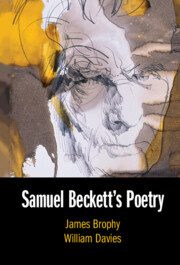Book contents
- Samuel Beckett’s Poetry
- Samuel Beckett’s Poetry
- Copyright page
- Contents
- Notes on Contributors
- Acknowledgements
- Abbreviations
- Introduction
- Chronology of Samuel Beckett’s Poetry
- Chapter 1 Weirdness and Dislocation in Beckett’s Early Poetry
- Chapter 2 Whole Fragments
- Chapter 3 Pre-echoing the Bones
- Chapter 4 ‘The Nucleus of a Living Poetic’
- Chapter 5 Beckett Growing Gnomic
- Chapter 6 Gender, Pronoun and Subject in ‘Poèmes 1937–1939’
- Chapter 7 The Missing Poème
- Chapter 8 Romanticism and Beckett’s Poetry
- 9 Romance under Strain in ‘Cascando’
- Chapter 10 Samuel Beckett’s Self-Translated Poems
- Chapter 11 Samuel Beckett’s Translations of Mexican Poetry
- Chapter 12 Beckett’s Poetry and the Radical Absence of the (War) Dead
- Chapter 13 Beckett’s Sound Sense
- Chapter 14 The Matter of Absence
- Chapter 15 ‘Mocked by a Tissue That May Not Serve’
- Chapter 16 Invoking Beckett
- Index
Chapter 7 - The Missing Poème
Beckett’s fêtes galantes
Published online by Cambridge University Press: 15 December 2022
- Samuel Beckett’s Poetry
- Samuel Beckett’s Poetry
- Copyright page
- Contents
- Notes on Contributors
- Acknowledgements
- Abbreviations
- Introduction
- Chronology of Samuel Beckett’s Poetry
- Chapter 1 Weirdness and Dislocation in Beckett’s Early Poetry
- Chapter 2 Whole Fragments
- Chapter 3 Pre-echoing the Bones
- Chapter 4 ‘The Nucleus of a Living Poetic’
- Chapter 5 Beckett Growing Gnomic
- Chapter 6 Gender, Pronoun and Subject in ‘Poèmes 1937–1939’
- Chapter 7 The Missing Poème
- Chapter 8 Romanticism and Beckett’s Poetry
- 9 Romance under Strain in ‘Cascando’
- Chapter 10 Samuel Beckett’s Self-Translated Poems
- Chapter 11 Samuel Beckett’s Translations of Mexican Poetry
- Chapter 12 Beckett’s Poetry and the Radical Absence of the (War) Dead
- Chapter 13 Beckett’s Sound Sense
- Chapter 14 The Matter of Absence
- Chapter 15 ‘Mocked by a Tissue That May Not Serve’
- Chapter 16 Invoking Beckett
- Index
Summary
The months that followed Beckett’s return to Paris on 26 October 1937, which would see him settle in the city until his death sixty-two years later, could not have been more tumultuous. Before the year was out he reconnected with Joyce and his circle as well as his Dublin friend Brian Coffey, heard that his novel Murphy had finally been accepted for publication by Routledge, and started an affair with Peggy Guggenheim. In November he also went back to Dublin to testify at the Oliver St. Gogarty trial. And before the first week of January 1938 was over, he had met Hemingway through Sylvia Beach, received the collected works of Kant he had ordered while in Germany, and got himself stabbed by a pimp called Prudence during one of his nightly sojourns. The subsequent period of hospitalisation, from 7 to 22 January 1938, brings together some of the protagonists that will feature in the story that follows: Brian Coffey, Peggy Guggenheim, Suzanne Déchevaux-Dumesnil, the proofs of Murphy, Verlaine (in absentia) and, here reduced to a very minor role, James Joyce. This rather intense phase of Beckett’s life, in emotional, geographic and creative terms, which continued across 1938 and 1939, resulted in a series of poems written in French, starting with the poem ‘they come’ penned (in English, however) immediately after his release from the Hôpital Broussais.1 The precise order in which these poems were written remains rather nebulous, though Seán Lawlor and John Pilling have gone as far as possible in unravelling the sequence in their critical edition of Beckett’s Collected Poems and elsewhere.2 Twelve of these poems were eventually published as ‘Poèmes 38–39’3 in the second issue of the journal Les Temps modernes in 1946, but in 1938 and 1939, as John Pilling points out, ‘Beckett’s French poems were either a private matter between him and [his friends], or at best a trial-and-error type experience to be disclosed to a circle or coterie of close friends’.4 Arguably the most personal and unusual poem of this period, however, was only discovered in 2013 by the poet Peter Manson while researching the Getty Research Institute Archives in Los Angeles.5 Entitled ‘Match Nul ou L’Amour Paisible’, the poem is part of an undated typescript that Beckett sent to E. L. T. Mesens, the Belgian surrealist who edited the short-lived London Bulletin (April 1938 – June 1940).6 It was obviously not accepted for publication by Mesens, and remains unpublished.
- Type
- Chapter
- Information
- Samuel Beckett's Poetry , pp. 115 - 125Publisher: Cambridge University PressPrint publication year: 2022



